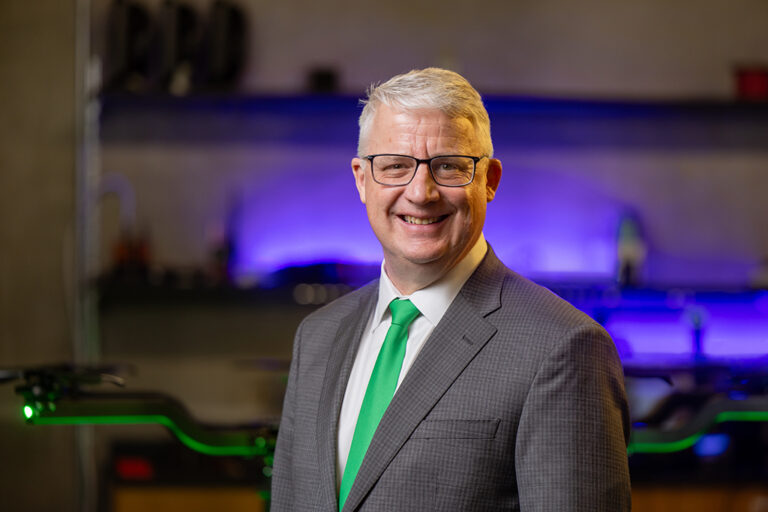Of planes, trains and things that fall down
UND’s Master of Disaster, George Bibel, tapped by Congress to be subject matter expert on new rules for oil train brakes

George Bibel likes to make complicated things simple.
“I really like simple explanations of things,” said Bibel, a professor of mechanical engineering, industry consultant and international media expert on plane crashes and train wrecks.
He became interested in them while working to make his lectures more interesting, and his research has led to three oft-cited books.
“I like to tell stories,” Bibel said. “Freshman physics students learn about a cart rolling down a ramp. That’s boring. But a runaway train that ends in disaster? They can connect the dots.”
His students learn, Bibel said, to connect mechanical engineering principles to extreme examples, such as engineering disasters like plane crashes and train wrecks. His engineering disasters course attracts aerospace students as well as mechanical engineers, and is taken occasionally by civil and electrical engineering students.
What Bible finds equally gratifying is when professional engineers recognize his expertise. He was recently consulted by the Government Accountability Office (GAO), an independent, nonpartisan agency that works for the U.S. Congress, as a subject matter expert in a new report to Congress titled “Train Braking.” The study was specific to oil trains, and discusses new rules mandating electronic brakes on crude oil trains.
“Many issues today are the same that occurred in the late 19th century when they first tried to use automatic air brakes on trains,” said Bibel. “Because it was unsafe to mix automatic air brake cars with non-automatic, it took decades to convert freight cars to automatic. They have a similar problem today mixing electronic brakes with air-braked cars.”
His expertise is valuable as communities across the region and the nation wrestle with safety questions and the potential hazards of petroleum-hauling trains carrying volatile commodities quietly through populated areas multiple times a day.
Wrecks are rare
Planes and trains are extremely safe, Bibel said. “They’re safer than driving.”
And crashes and wrecks are rare: “That’s what makes them interesting,” he said. “It’s not a message on lack of safety.”
Bibel’s ability to explain complicated disasters in a simple way has attracted national and international attention. He’s frequently interviewed by national media, including all cable news networks, The New York Times, National Public Radio, The New York Post, Popular Science, Scientific American, and radio stations in large markets. He wrote an article, “Listen Up and Fly Right,” which was printed in The New York Times and reprinted in international newspapers.
His books are often read in the industry. Beyond the Black Box: The Forensics of Airplane Crashes was developed into a training seminar presented to Boeing Co. three times. That book begins with the 1931 plane crash that killed legendary football coach Knute Rockne, and looks at plane crash investigations to determine why planes fall from the sky.
One interesting takeaway: the “black box” that records pilot activity is actually orange, and there are two of them. They contain the cockpit voice recorder and the flight data recorder, vital in analyzing airplane crashes.
His second book, Train Wreck: The Forensics of Rail Disasters, also received national attention. It focuses on runaway trains, bearing failures, metal fatigue, crash testing, the dynamics of collisions, and bad rails.
“I start the book by apologizing to the industry,” Bibel said. “Most trains don’t crash and are very safe.”
Another book
He is currently working on his third book, which focuses on airline disasters and is co-written with a certified Boeing/Airbus pilot.
Bibel earned his Ph.D. from Case Western Reserve University in 1987 and his master’s degree from the University of Michigan. He began his engineering career at Standard Oil Co., now BP (British Petroleum), and was promoted to head of the pressure vessel, piping and tankage group before working at NASA Lewis as a university researcher and summer faculty fellow.
A consultant with Boeing, United Technologies and now the GAO, Bibel has been invited to speak at NASA, the Seattle Museum of Flight, the University of Sao Paulo in Brazil, the International Council of Aeronautical Sciences in Australia, the National Society of Professional Engineers, and many other academies and educational institutions
Although Bibel likes to figure out how to make complicated things simple, sometimes things truly are complicated. And that’s given him fodder for his books.
“Aerospace really is rocket science,” Bibel said. “It can be hard to figure out simple explanations.”


